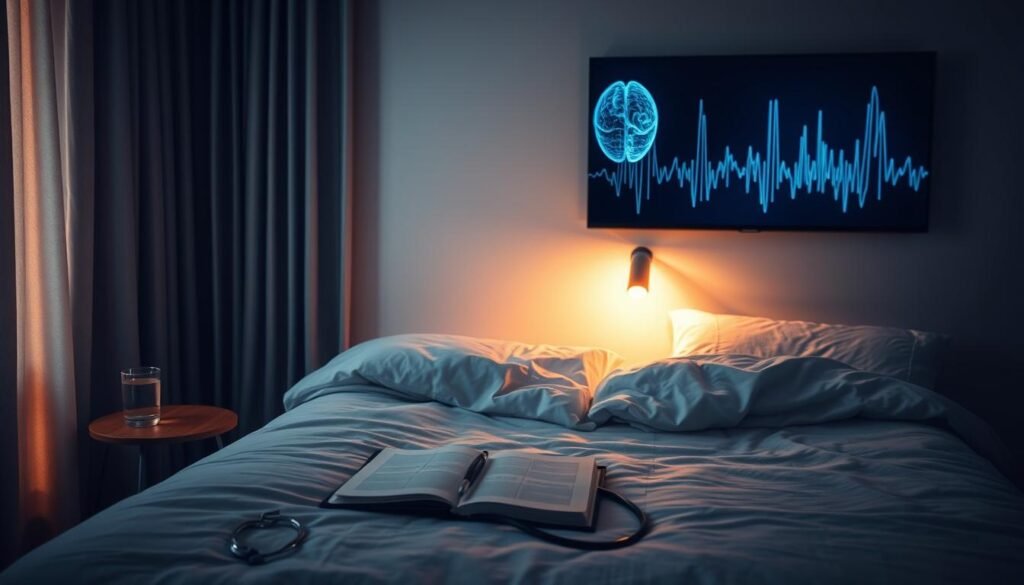Did you know that around 50-70 million adults in the U.S. struggle with sleep disorders? Insomnia is the most common issue among them. This high number shows how big of an effect insomnia can have on daily life and overall health. Not getting enough sleep doesn’t just make you tired. It can harm your mental and physical health in big ways.
More and more people are starting to talk about insomnia and sleep problems. This is good because it raises awareness. Talking about it can help those who can’t sleep at night find solutions.
It’s important to get advice from doctors about insomnia. Sometimes, getting a second opinion can show new ways to deal with sleep problems. There are specialists in sleep disorders who can help. They could offer strategies you haven’t tried yet.
Everyone should treat sleep issues seriously. If you have trouble sleeping, you should look for help. It could make a big difference in getting back to sleeping well at night.
Key Takeaways
- Approximately 50-70 million adults in the U.S. face sleep disorders, primarily insomnia.
- A sleep disorder specialist can offer valuable insights for insomnia management.
- Getting a second opinion on insomnia can lead to personalized treatment approaches.
- Effective management of insomnia is critical for mental and physical health.
- Many individuals are unaware of the beneficial options available for treating insomnia.
Understanding Insomnia: Types and Symptoms
Insomnia comes in different forms, each affecting health in unique ways. It’s important to know these insomnia types to tackle sleep challenges effectively. Recognizing them helps in finding the right treatment.
Acute vs. Chronic Insomnia
Acute insomnia and chronic insomnia are the main categories. Acute insomnia is short-term, usually caused by stress or life changes. It lasts less than three months. On the other hand, chronic insomnia lasts for months, happening at least three nights a week. It greatly affects one’s well-being.
Signs and Symptoms to Note
Knowing the symptoms of insomnia is key to identifying sleep problems. Key symptoms include:
- Difficulty falling asleep at night, or sleep onset insomnia
- Waking up at night and not being able to sleep again, known as sleep maintenance insomnia
- Waking up too early and not getting back to sleep, called terminal insomnia
- Experiencing all these issues, which is mixed insomnia
Understanding these symptoms and types is the first step to better sleep. This knowledge is crucial for seeking effective solutions and enhancing sleep health.
Causes of Insomnia
Understanding why people can’t sleep is key to helping them. Nearly one in three adults struggle with insomnia, affecting their mental health and happiness. Insomnia can come from long-term issues needing treatment.
Physical and Mental Health Factors
Insomnia often comes from physical health problems. Issues like chronic pain and neurological diseases disrupt sleep. Also, about 40% of those with sleep problems have mental health challenges, such as anxiety and depression. This shows the need for care that looks at both physical and mental health.
Impact of Lifestyle Choices
Our choices affect our sleep too. Drinking caffeine, not keeping a regular sleep time, and too much screen time all make sleeping hard. Small lifestyle tweaks can improve sleep. For seniors, short naps of 15 to 20 minutes are best. Talking to a doctor can help find the right changes for better sleep. For more on the effects of not sleeping well, check out this detailed guide.
The Importance of Sleep for Overall Health
Sleep is more than just resting. It’s a key part of being healthy. Not getting enough sleep can cause health problems. This shows how important good sleep is every day.
Consequences of Sleep Deprivation
Not sleeping well has many effects. It can hurt your body and mind. Not sleeping enough for a while can make it hard to focus, drain your energy, and worsen your mood. People not sleeping enough over time might get obesity, heart disease, or infections. Also, a lot of people have trouble sleeping. This shows how big of an issue it is.
Sleep’s Role in Mental and Physical Wellbeing
Getting enough sleep is crucial for your mind and body. It affects your mood and how you think. It also keeps your body healthy. People not sleeping well could get anxiety or depression. Sleep affects your mental health just like eating well and exercising do. Making sure you sleep enough can really help your overall life.
Seeking a Sleep Disorder Specialist
If you can’t sleep well despite trying hard, it’s time to see a specialist. You might notice loud snoring, trouble breathing at night, or feeling very tired during the day. These signs suggest you may need special care for your sleep issues.
When to Consult a Specialist
It’s important to know when to get help for sleep problems. Think about seeing a sleep specialist if:
- Insomnia lasts more than three months.
- You’re too tired during the day to do your usual stuff.
- Snoring or choking disrupts your sleep often.
- Your mood or energy levels have dropped.
Getting help early from a sleep expert can really improve your health.
How to Find a Qualified Sleep Doctor
Looking for a sleep doctor takes some effort to find the right one. Here’s what to do:
- Ask your regular doctor or friends for suggestions.
- Find certified sleep centers via the American Academy of Sleep Medicine.
- Check if the doctor specializes in sleep medicine.
- Look up the doctor’s experience, focusing on sleep issues like yours.
Talking to different experts, like sleep psychologists or brain doctors, expands your treatment options. Smart choices help solve your sleep problems better.

Getting a Second Opinion on Insomnia
Understanding insomnia well can make a big difference in your treatment. It’s good to get a second opinion. This helps find new ways to deal with sleep issues and ensures the treatment fits what you need. You might discover new options or confirm your current plan is right.
Why a Second Opinion Can Be Beneficial
Visiting a different sleep clinic for another view can be eye-opening. Here are the perks:
- Validation of Diagnosis: A fresh look at your situation might confirm your initial diagnosis.
- Broadened Treatment Options: New doctors could suggest different treatments or habits you hadn’t considered.
- Reassurance: Feeling that experts agree on your treatment can ease your worries.
What to Expect During a Consultation
If you seek a second opinion, be ready for a detailed check-up. Here’s what usually happens:
- Initial Evaluation: You’ll talk about your health history and what treatments you’ve tried.
- Sleep Studies: They might suggest sleep studies to learn more about your sleep troubles.
- Personalized Insights: You’ll get advice that fits your specific situation and lifestyle.
Being part of a second opinion discussion means sharing openly. This can lead to better insights into treating insomnia. Getting another opinion helps you take charge of your health. It steers you to the best solutions for peaceful sleep.
Insomnia Diagnosis Process
Understanding and managing insomnia begins with a detailed diagnosis process. Doctors start by looking at your sleep habits. They often use sleep diaries or questionnaires to track your sleep and any disruptions.
Evaluating Sleep Patterns
Evaluating sleep habits is key to finding root causes of sleep issues. You might need to keep a sleep diary for one to two weeks. This diary should note your bedtime, wakeup times, and any times you wake up during the night. You could also need to wear a device for three to fourteen days. This device, called an actigraph, tracks when you are asleep and awake.
Medical Tests and Assessments
In addition to diaries and devices, doctors may do physical exams and other tests. These help rule out other reasons for your insomnia. You might have a sleep study called polysomnography if changing your lifestyle doesn’t help. This study tracks your sleep quality and looks for disorders like sleep apnea or restless legs syndrome. Doctors might also test your blood for conditions like thyroid problems or iron deficiencies that can impact sleep. For more details, check out this resource.

| Test | Description | Duration |
|---|---|---|
| Sleep Diary | A log of sleep habits over 1-2 weeks. | 1-2 weeks |
| Actigraphy | Device worn to monitor sleep-wake patterns. | 3-14 days |
| Polysomnography | Comprehensive sleep study in a lab setting. | 1 night |
| Blood Tests | Checks for underlying medical issues affecting sleep. | Varies |
Effective Insomnia Treatment Options
Many adults struggle with insomnia, finding it hard to get good sleep. There are several ways to treat insomnia. Each one fits different sleep problems.
Behavioral Therapies: CBT for Insomnia
Cognitive behavioral therapy for insomnia (CBT-i) is a top method for sleep issues. It tackles the negative thoughts and actions that disrupt sleep. Research shows CBT-i can lessen the time it takes to fall asleep by 19 minutes. It also increases total sleep by about 8 minutes.
These improvements are similar to those from sleep meds, but without the bad side effects. CBT-i’s benefits last even after the therapy ends. This is helpful since 10% to 30% of adults suffer from some insomnia.
Medication: Risks and Benefits
Medications offer quick help for insomnia. They include drugs like benzodiazepines and newer options like ramelteon and suvorexant. But, there are risks to consider. Side effects include memory issues and feeling tired after waking up.
Even with medicine, some people still have trouble sleeping. This raises concerns about becoming dependent and having withdrawal symptoms. Experts recommend evaluating all options before choosing meds because of these risks.
Alternative Treatments and Lifestyle Adjustments
Other treatments for insomnia are also important. Things like melatonin supplements and relaxing before bed can help. Also, keeping a regular sleep schedule makes a big difference in sleep quality.
Adding exercise, cutting down on caffeine, and making your bedroom peaceful are key too. For more info on treating insomnia, you can read this article.
Insomnia Consultation Benefits
Getting help for insomnia comes with big benefits. Seeing a sleep expert helps create treatments just for you. It also helps you learn more about sleep problems. This knowledge lets you handle your sleep issues better.
Personalized Treatment Plans
Since everyone’s insomnia is different, treatments need to be personal. Specialists look at your age, life, and mind to make a plan just for you. This means you’re more likely to stick with it and be happy with the results. They blend behavior changes and medicine to find the best solution for you.
Enhanced Understanding of Sleep Disorders
Learning more about sleep disorders is another big plus. Knowing the impact of insomnia improves how you deal with it. You get to understand what causes your sleep issues, like stress or habits. This knowledge gives you power over your sleep health.

The benefits of insomnia consultation are huge. You get a treatment plan that’s made just for you and you learn lots about sleep problems. This double benefit helps you manage your insomnia better. It breaks the cycle of bad sleep, leading to a healthier life.
When to Consider a Second Opinion Sleep Clinic
Are you unsure if your current insomnia treatment works? It might be time to consider a second opinion sleep clinic. Knowing when to seek help is crucial for better sleep. Spotting the signs that your treatment isn’t effective is the first step toward enjoying restful nights again.
Signs Your Current Treatment Isn’t Working
There are several signs that your treatment might not be effective. These signs include:
- Persistent Insomnia: Trouble falling or staying asleep, often for three nights a week or more.
- Worsening Symptoms: Increased sleep-related anxiety, extreme tiredness during the day, or mood changes.
- Side Effects: Unbearable side effects from medication affecting your daily life.
- Frequent Awakenings: Often waking up at night may mean your current treatment isn’t right.
Evaluation of New and Emerging Treatments
Be aware of the latest treatments for insomnia. These new advancements can offer hope. A second opinion clinic can give you access to cutting-edge therapies. By looking into these new options, you might find a solution that truly helps.
Understanding when to seek a second opinion is key. It’s important for your health and finding the right way to tackle sleep issues.
Conclusion
Insomnia is a common problem seen in doctors’ offices, but it’s sometimes missed. Getting a second opinion on insomnia can be very helpful. It can reveal new treatment options, confirm your diagnosis, and help improve your sleep.
Specialists can offer important advice that could significantly change how insomnias is managed. They bring valuable insights into your condition.
It’s important to know that insomnia can come from different places. These include your mind, where you live, and how you live. Seeing a specialist helps address these factors fully. Also, since about 52% of doctors don’t always check for insomnia, patients need to stand up for their sleep health.
Good sleep hygiene can make a big difference in sleep quality. But, getting better sleep usually takes more steps. It means keeping up with treatments and maybe needing more help. Learning about sleep problems and thinking about getting a second opinion on insomnia are key steps. They help improve your health and let you enjoy deep, healing sleep.